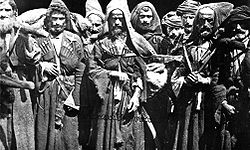- Abkhaz people
-
Abkhaz
(Аҧсуа)
Total population ca. 200,000 - 600,000 Regions with significant populations  Turkey
Turkey39,000 - 500,000 [1][2][3][4]  Abkhazia
Abkhazia94,606 [5]  Georgia (without Abkhazia)
Georgia (without Abkhazia)3,527 [6]  Russia
Russia11,366 [7]  Syria
Syria5,000 [4]  Germany
Germany5,000 [4]  Ukraine
Ukraine1,458 [8] Languages Religion Related ethnic groups The Abkhaz or Abkhazians (Abkhaz: Аҧсуа, Apswa) are a Caucasian ethnic group, mainly living in Abkhazia, a disputed region on the Black Sea coast. A large Abkhazian diaspora population resides in Turkey, the origins of which lie in the emigration from the Caucasus in the late 19th century known as Muhajirism. Many Abkhazians also live in other parts of the former Soviet Union, particularly in Russia and Ukraine.[9]
Contents
Origins
The Abkhaz language belongs to the Northwest Caucasian languages group. Classical sources speak of several tribes dwelling in the region, but their exact identity and location remains controversial. The Abasgoi and Apsilai of the Graeco-Roman authors are considered as the predecessors of modern-day Abkhaz.
The integration of various smaller ethnic subgroups into the modern-day Abkhaz people was basically completed by the late 10th century, but some of these groups were deprived of their homeland when the Russian conquest of northwestern Caucasus forced them to become Muhajirs and emigrate to the Ottoman possessions.
History
When the Anchabadze dynasty established the Kingdom of Abkhazia in the 780s and freed themselves from the Byzantine hegemony, Abkhazia became a part of the Georgian cultural world. The local nobility, clergy and educated classe used Georgian as a language of literacy and culture. Georgian would remain the second language for many Abkhaz until Russian replaced it in the early 20th century. From the early 11th to the 15th century, Abkhazia was a part of the all-Georgian monarchy, but then became a separate Principality of Abkhazia only to be conquered by the Ottomans. The Russian conquest of Abkhazia from the 1810s to the 1860s was accompanied by a massive expulsion of Muslim Abkhaz to the Ottoman Empire and the introduction of a strong Russification policy. As a result, the Abkhaz diaspora is currently estimated to measure at least twice the number of Abkhaz that reside in Abkhazia. The largest part of the diaspora now lives in Turkey, with estimates ranging from 100,000 to 500,000, with smaller groups in Syria (5000) and Jordan. In recent years, some of these have emigrated to the west, principally to Germany (5000), the Netherlands, Switzerland, Belgium, France, the United Kingdom, Austria and the United States (mainly to New Jersey).[10]
After the 1917 revolution, Abkhazia was shortly occupied by the Democratic Republic of Georgia, but was conquered by the Red Army in 1921 and eventually entered the Soviet Union as an Soviet Socialist Republic associated with the Georgian SSR. The status of Abkhazia was downgraded in 1931 when it became an autonomous republic within Georgia. Under Joseph Stalin, a forcible collectivization was introduced and the native Communist elite purged. The influx of Armenians, Russians and Georgians into the growing agricultural and tourism sectors was also encouraged, and Abkhaz schools were briefly closed. By 1989, the number of Abkhazians was about 93,000 (18% of the population of the republic), while the Georgian population numbered 240,000 (45%). The number of Armenians (15% of the entire population) and Russians (14%) also substantially grew.
The 1992-1993 War in Abkhazia left the Abkhaz an ethnic plurality of ca. 45%, with Russians, Armenians, Georgians, Greeks, and Jews comprising most of the remainder of the population of Abkhazia. The 2003 census established the total number of Abkhaz in Abkhazia at 94,606.[5] However, the exact demographic figures for the region are disputed and alternative figures are available.[11] The de facto Abkhaz president Sergey Bagapsh suggested, in 2005, that less than 70,000 ethnic Abkhaz lived in Abkhazia.[12]
Religion
See also: Religion in AbkhaziaThe Abkhaz people are principally divided into Orthodox Christian and Sunni Muslim communities but the indigenous non-Abrahamic beliefs have always been strong.[13] Christianity was introduced, in the 6th century, by the Byzantine emperor Justinian I, and further enforced under the kings of Georgia in the high Middle Ages. The Ottoman takeover in the 16th century, missionaries such as Sufi preachers and the pressure from the Adyghe tribes (most of whom had converted to Islam) from the North precipitated the decline of Christianity and the region became largely Muslim until the 1860s when Muhajirism left Christians in majority.
See also
- Afro-Abkhazians
- Women in Abkhazia
Notes
References
- ^ Abkhaz. Lewis, M. Paul (ed.), 2009. Ethnologue: Languages of the World, Sixteenth edition. Dallas, Tex.: SIL International. Online version
- ^ (2009) Abkhazia Seeking Turkish Recognition of Independence
- ^ (2009) ABKHAZIA’S DIASPORA: DREAMING OF HOME
- ^ a b c Chirikba 2003 p8
- ^ a b (2003) 2003 Census statistics (Russian)
- ^ (2002)
- ^ 2002 Census statistics (Russian)
- ^ [1]
- ^ Caucasian Information
- ^ Chirikba 2003 p6-8
- ^ Georgians and Abkhazians. The Search for a Peace Settlement (Notes and References section), by various authors, Vrije Universiteit Brussel, August 1998.
- ^ Bagapsh Speaks of Abkhazia’s Economy, Demographic Situation. Civil Georgia. 10 October 2005
- ^ Johansons, Andrejs. (Feb., 1972) The Shamaness of the Abkhazians. History of Religions. Vol. 11, No. 3. pp. 251-256.
- Chirikba, Viacheslav (2003). Abkhaz. Languages of the World/Materials. 119. Munich: LINCOM EUROPA. ISBN 3895861367.
- David Marshall Lang, Caucasian studies, University of London, 1964, Vol.1
- Roger Rosen, Abkhazia, Library of Congress Catalogue, 2004, ISBN 962-217-748-4
Eastern and Oriental Orthodox Christian Ethnic Groups Majority EuropeanArmenians · Aromanians · Belarusians · Bulgarians · Georgians · Greeks (including Greek Cypriots) · Macedonians · Megleno-Romanians · Moldovans · Montenegrins · Ossetians · Romanians · Russians · Serbs · UkrainiansAfro-AsiaticAltaicUralicChukotko-KamchatkanMinority Categories:- Abkhaz people
- Muslim communities
Wikimedia Foundation. 2010.




